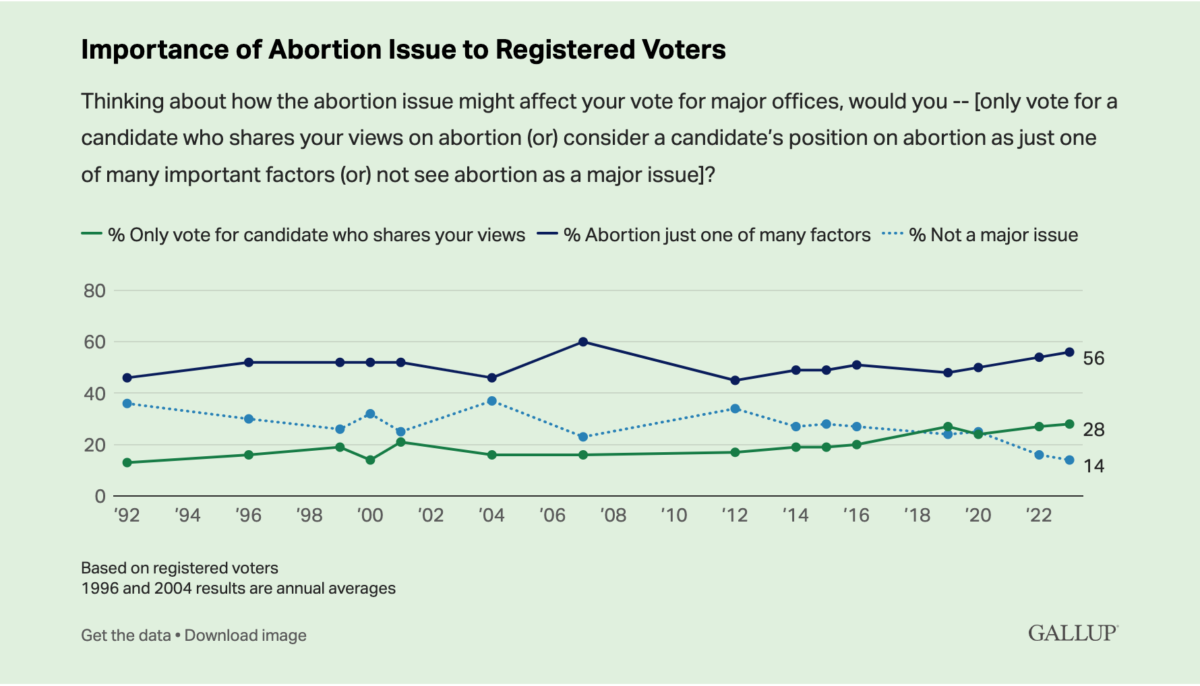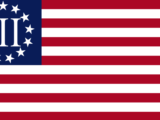Public Opinion Analysis –
By Glynn Wilson –
WASHINGTON, D.C. — A year after voters in the United States attached record-high importance to abortion as an election issue after the Supreme Court overturned decades of settled law to make its legality questionable again, a new Gallup poll finds the issue retaining its potency especially for those on the pro-choice side of the debate.
As it stands, 28 percent of registered voters say they will ONLY vote for candidates for major offices who share their position on abortion, one percentage point higher than the previous high of 27 percent recorded in 2022 and 2019.
A record-low 14 percent now say abortion is not a major issue in their vote. While similar to last year’s 16 percent, it is down nine points from the prior low of 23 percent recorded in 2007.
The remaining 56 percent now say abortion is just one factor among many to their vote. This is similar to the 54 percent in 2022 but significantly higher than the 45 percent to 51 percent readings over the prior decade.
Last year’s survey was conducted May 2-22, after a draft of the Supreme Court’s Dobbs v. Jackson Women’s Health Organization opinion was leaked, showing that the court planned to nullify constitutional protection for abortion. This year’s findings come from a May 1-24 Gallup survey.
Since the Dobbs decision was handed down last June, a number of states have passed new abortion laws through the legislative process or voter referenda — some seeking to restrict abortion access further than was allowed before Dobbs, while others sought to codify a right to abortion in state constitutions.
Looking at these responses by voters’ point of view on abortion reveals which types of candidates stand to benefit or suffer from their stance on the issue. As it stands, 33 percent of registered voters who identify as pro-choice say they will only vote for a candidate who agrees with them on abortion, versus 23 percent of pro-life voters. This advantage for the pro-choice side is new.
After more than two decades when abortion-centric pro-life voters slightly outnumbered abortion-centric pro-choice voters in the electorate, the pro-choice side jumped ahead by a historically wide seven-point margin last year, and that difference persists today.
Seventeen percent of all voters in 2022 and 2023 have said they are pro-choice on abortion and will only vote for candidates for major offices who share their views on the issue.
Ten percent of voters in both years have said they are pro-life on abortion and will only back candidates who share their views.
Demographic Differences
The stability of views in 2022 and 2023 makes it possible to review combined data for these years to evaluate the importance of abortion as a voting issue to different subgroups of the population since the Dobbs leak, Gallup says.
As shown in the table below, women are more likely to be committed pro-choice than pro-life voters, whereas men are more equally divided. And while both younger and older women are more likely than men to be pro-choice voters, the rate is particularly high, at 28 percent, among younger women (those aged 18 to 49). This contrasts with 18 percent of women aged 50 and older and 11 percent of men in both age groups.
Significant differences are also seen along racial/ethnic lines. Black and to a lesser extent non-Hispanic White registered voters are more pro-choice than pro-life in their voting orientation, while Hispanic voters are evenly divided.
In terms of partisanship, a higher percentage of Democrats are pro-choice voters (37 percent) than Republicans are pro-life voters (21 percent), indicating that Democratic candidates are poised to benefit disproportionately from pro-choice intensity at the ballot box in the wake of Dobbs.
There is no difference between Protestants’ and Catholics’ likelihood of being committed pro-choice or pro-life voters, with both groups about evenly divided between the two camps. However, nonreligious voters are highly distinct, with 31 percent being committed pro-choice voters and only 1 percent committed pro-life voters.
Gallup’s Bottom Line
“Not only did the Supreme Court’s Dobbs decision cause more Americans to identify as pro-choice than had for the prior quarter century, but it also caused that expanded group of pro-choice identifiers to attach greater importance to a candidate’s abortion stance when they vote,” Gallup concludes in its analysis. “Meanwhile, the diminished pro-life segment of the electorate is less energized on the issue than they have been previously, indicating that the desire to see laws changed is more motivating to voters than wanting current laws maintained.”
This dynamic likely explains, at least in part, the outcome of recent state abortion ballot measures where even some Republican states have turned down proposed constitutional bans on abortion. It could also have been at work in the 2022 midterm congressional elections, which resulted in more favorable results for the Democratic Party than were anticipated by traditional preelection metrics, such as the incumbent president’s low job approval rating and lackluster consumer confidence.
The 2022 exit polls suggest abortion was an important factor in many voters’ decision to back Democratic candidates then, and if current attitudes persist, the same could happen in 2024.
___
If you support truth in reporting with no paywall, and fearless writing with no popup ads or sponsored content, consider making a contribution today with GoFundMe or Patreon or PayPal. We just tell it like it is, no sensational clickbait or pretentious BS.














